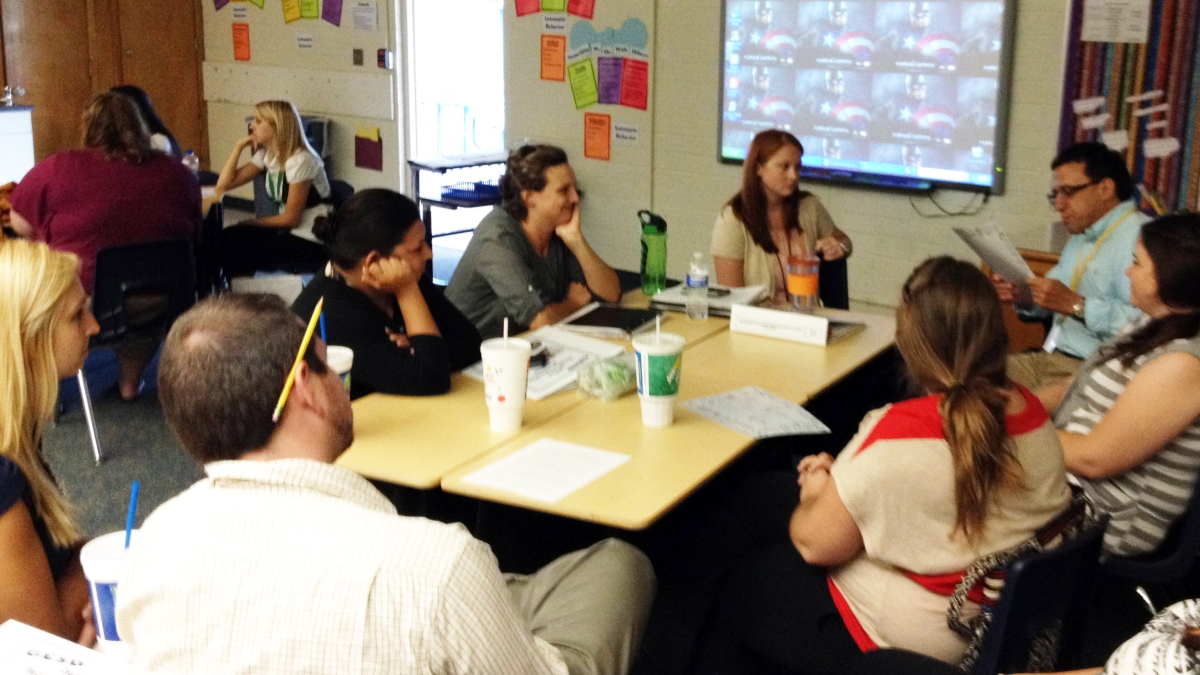Student's project targets special education teacher retention

Unfortunately the position of special education teacher is a job that is known for a high turnover rate. “Rookie” special education teachers are especially susceptible to leaving the profession. So Breck Imel decided to plan and implement a project to address this issue as she pursued her doctoral degree in educational leadership and innovation through ASU’s Mary Lou Fulton Teachers College.
Imel, who serves as special education achievement advisor for the Glendale Elementary School District, was rewarded for her efforts when the district achieved a 100 percent retention rate among its new special education teachers. All 15 teachers hired for the 2011-12 school year returned for 2012-13.
“Breck selected a wickedly difficult problem to tackle – the retention of newly hired special education teachers in a low-income school district with a large number of students who are English language learners,” said Teachers College professor Keith Wetzel, who served as Imel’s doctoral committee co-chair. “Due to the high turnover of teachers, children with the most difficult learning problems seldom are taught by experienced teachers who are better prepared to address the unique needs of these children.”
In her project Imel enlisted the participation of a number of those experienced teachers to serve as induction coaches to the new hires. In addition to supporting the new teachers, the project served to develop the leadership skills of the coaches and of Imel herself.
The goal, according to Imel, was to work collaboratively to develop special education induction coaches who not only know how to manage an induction program, but to lead the new teachers in gaining a better understanding of compliance of special education services and paperwork while also increasing capacities of instruction.
“I knew I wanted to support new teachers, develop the leadership capacities of up-and-coming teachers, develop my own leadership and give back to the district,” she said. “I realized that if I could develop the leadership of the teachers who became the special education induction coaches to support new teachers, there would be a positive impact in the district. Through this process of taking responsibility for my own leadership shortcomings, I became acquainted with the Authentic Leadership Theory. The tenets of this theory really ‘spoke’ to me. I decided to authentically lead the induction coaches in supporting the special education induction teachers of the 2011-2012 school year.
“Now looking back on the year, I think I became more inspired as I saw the passion grow in the induction coaches and then the positive outcomes as articulated from the teachers,” Imel said.
Among the first-year teachers who arrived in 2011 was Mairead Fisher.
“I found the induction program to be extremely beneficial,” Fisher said. “I felt very anxious my first months of teaching. The induction program allowed me to get feedback and strategies from veteran teachers as well as learn about what other first-year teachers were experiencing. The induction sessions are something I look forward monthly, and I feel it’s especially helpful for special education teachers because most other teachers and administrators do not have special education experience.”
One of the 2011-12 induction coaches was Aisha Brooks Austin, who worked in a team with two other experienced special education teachers.
“Working through the process we discovered that what the new teachers really needed was to learn to trust and sometimes modify the ideas they already had so that their students could be more successful,” Brooks Austin said. “At Breck’s prompting we decided to collect data and ask the new teachers the burning question, ‘What do you really need?’ This data changed our thinking and ultimately changed the way we helped new teachers learn. We collected data from the new teachers and created workshops that truly met their needs. We covered topics such as how to teach flexible reading, writing and math groups, appropriate ways to work with classroom assistants, and implementing mainstreaming. The new teachers flourished and gained confidence.
“Breck never imposed her way on us. Instead she continued to revise and rewrite her dissertation. Her main objective was always the best interest of the new teachers, instead of her data,” Brooks Austin said.
In addition to completing her doctoral degree (she graduated in December), Imel has earned the satisfaction of being asked by the school district not only to continue the induction program but to expand it to include second-year teachers.
Offered on ASU’s West campus, the Teachers College doctoral program in educational leadership and innovation emphasizes collaborative work among students and professors. Students admitted to the program are practicing leaders in educational settings, from elementary schools through community colleges and universities. The doctoral program provides students with repeated practice at implementing changes in their work settings and analyzing the results of those changes.
Students conduct much of their work as part of Leader-Scholar Communities, small groups of students mentored by two professors. Leader-Scholar Community members support one another as they design, implement and evaluate applied research projects to bring about positive changes in their workplaces.
“Our Ed.D. program has proven extremely popular with educators who want to become more thoughtful, intentional and informed leaders, whether they work in a K-12 setting or with adult learners,” said Suzanne Painter, associate professor and director of the Division of Educational Leadership and Innovation in Teachers College. “And it is gratifying to see the program have the effects we intended – to help improve K-12 educational practices by empowering local leaders to effect change.”
More information about the degree may be found at http://education.asu.edu/programs/view/doctor-of-education-in-educational-leadership-and-innovation.